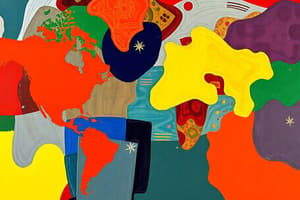Podcast
Questions and Answers
What branch of political science focuses on the concepts of governance and justice?
What branch of political science focuses on the concepts of governance and justice?
- Political Economy
- Comparative Politics
- Political Theory (correct)
- Public Administration
Which of the following areas of study analyzes voter behavior and public opinion?
Which of the following areas of study analyzes voter behavior and public opinion?
- Political Behavior (correct)
- International Relations
- Public Policy
- Political Theory
What does Public Administration primarily deal with?
What does Public Administration primarily deal with?
- Implementation of public policy (correct)
- Theoretical concepts of democracy
- Political party dynamics
- International diplomacy
Which political scientist is known for the systems theory of political science?
Which political scientist is known for the systems theory of political science?
What is the primary focus of Comparative Politics?
What is the primary focus of Comparative Politics?
Which theory studies interactions between nations concerning conflict and diplomacy?
Which theory studies interactions between nations concerning conflict and diplomacy?
What concept refers to a state's authority to govern itself?
What concept refers to a state's authority to govern itself?
What type of research method combines both qualitative and quantitative approaches?
What type of research method combines both qualitative and quantitative approaches?
Flashcards are hidden until you start studying
Study Notes
Definition
- Political science is the systematic study of political institutions, behavior, processes, and power dynamics.
Key Concepts
-
Political Theory
- Focuses on ideas about governance, justice, rights, and the role of the state.
- Includes classical (e.g., Plato, Aristotle) and modern theorists (e.g., Machiavelli, Hobbes, Locke).
-
Comparative Politics
- Examines different political systems and their functions globally.
- Analyzes similarities and differences in governance, elections, and political culture.
-
International Relations
- Studies interactions between countries, including diplomacy, conflict, and trade.
- Key theories include realism, liberalism, and constructivism.
-
Public Administration
- Focuses on the implementation of public policy and the functioning of government agencies.
- Examines bureaucratic structures and public service ethics.
-
Political Economy
- Analyzes the relationship between politics and economics, including how policy affects economic performance.
- Explores concepts like development, globalization, and state-market relations.
Research Methods
- Qualitative Methods: Case studies, interviews, and ethnography.
- Quantitative Methods: Surveys, statistical analysis, and experiments.
- Mixed Methods: Combination of qualitative and quantitative approaches.
Major Areas of Study
- Political Behavior: Voter behavior, public opinion, and political participation.
- Political Institutions: Study of legislatures, executives, judiciaries, and electoral systems.
- Public Policy: Analysis of policy formation, implementation, and evaluation.
Contemporary Issues
- Globalization: Impact on national sovereignty and international cooperation.
- Human Rights: Examination of global standards and enforcement mechanisms.
- Environmental Politics: Interaction between politics and environmental issues.
- Populism: Rise of populist movements and their implications for democracy.
Key Theorists
- David Easton: Proposed the systems theory of political science.
- Robert Dahl: Contributed to the understanding of democracy and pluralism.
- Samuel P. Huntington: Known for theories on political development and the clash of civilizations.
Important Terms
- Sovereignty: The authority of a state to govern itself.
- Legitimacy: Acceptance of a governing body's right to rule.
- Bureaucracy: System of administration characterized by specialization and a hierarchy of authority.
Career Paths
- Academia, government service, non-governmental organizations (NGOs), international organizations, political consulting, and journalism.
Definition
- Political science involves systematic analysis of political institutions, behaviors, processes, and power structures.
Key Concepts
- Political Theory: Examines governance, justice, rights, and state roles; encompasses classical philosophers like Plato and Aristotle, as well as modern thinkers like Machiavelli and Locke.
- Comparative Politics: Investigates various political systems worldwide, focusing on governance patterns, elections, and political cultures' contrasts and similarities.
- International Relations: Analyzes country interactions, addressing diplomacy, conflict, and trade; key theories include realism, liberalism, and constructivism.
- Public Administration: Studies the execution of public policy and governmental functioning; scrutinizes bureaucratic frameworks and ethics in public service.
- Political Economy: Explores how politics and economics interrelate, concentrating on policy impacts on economic success; includes themes like development, globalization, and state-market dynamics.
Research Methods
- Qualitative Methods: Utilize case studies, interviews, and ethnographic research for in-depth insights.
- Quantitative Methods: Involve surveys, statistical analysis, and experiments to gather numerical data.
- Mixed Methods: Integrate qualitative and quantitative techniques for comprehensive analysis.
Major Areas of Study
- Political Behavior: Investigates voter tendencies, public opinion, and levels of political engagement.
- Political Institutions: Focuses on legislative bodies, executives, judicial systems, and electoral mechanisms.
- Public Policy: Analyzes the processes of policy creation, implementation, and assessment.
Contemporary Issues
- Globalization: Assesses its effects on national sovereignty and international collaboration.
- Human Rights: Investigates global standards of human rights and their enforcement.
- Environmental Politics: Explores the connection between political decisions and environmental challenges.
- Populism: Analyzes the emergence of populist movements and their impact on democratic systems.
Key Theorists
- David Easton: Introduced systems theory in political science, emphasizing the interconnections within political systems.
- Robert Dahl: Advanced perspectives on democracy and pluralism, highlighting diverse viewpoints in governance.
- Samuel P. Huntington: Known for his theories on political development, particularly the "clash of civilizations."
Important Terms
- Sovereignty: Refers to a state's autonomy in governing itself.
- Legitimacy: The recognition of a governing entity's right to rule by its constituents.
- Bureaucracy: A structured administrative system noted for specialization and hierarchical organization.
Career Paths
- Opportunities exist in academia, government roles, non-governmental organizations (NGOs), international bodies, political consultancy, and journalism.
Studying That Suits You
Use AI to generate personalized quizzes and flashcards to suit your learning preferences.




